#LAST_DAY. Flat 35% #Discount on All Pendrive & Android Courses. Valid until 23rd November Only.
Book Now – https://goo.gl/5mKTnz
Free Video Courses – https://goo.gl/jtMKP9
Free PDFs – https://goo.gl/cJufZc
Join TELEGRAM group of Study IQ – https://t.me/Studyiqeducation
Follow us on Facebook – https://goo.gl/iAhPDJ
Follow Dr Gaurav Garg on Facebook – https://goo.gl/xqLaQm
The Hindu Editorial Analysis – https://goo.gl/vmvHjG
Current Affairs by Dr Gaurav Garg – https://goo.gl/bqfkXe
UPSC/IAS Burning Issues analysis- https://goo.gl/2NG7vP
World History for UPSC – https://goo.gl/J7DLXv
Indian History – https://goo.gl/kVwB79
UPSC/IAS past papers questions – https://goo.gl/F5gyWH
SSC CGL + IBPS Quantitative tricks – https://goo.gl/C6d9n8
English Vocabulary – https://goo.gl/G9e04H
Reasoning tricks for Bank PO + SSC CGL- https://goo.gl/a68WRN
Error spotting / Sentence correction https://goo.gl/6RbdjC
Static GK complete- https://goo.gl/kB0uAo
Complete GK + Current Affairs for all exams- https://goo.gl/MKEoLy
World History – UPSC / IAS – https://goo.gl/kwU9jC
Learn English for SSC CGL, Bank PO https://goo.gl/MoL2it
Science and Technology for UPSC/IAS – https://goo.gl/Jm4h8j
Philosophy for UPSC/IAS – https://goo.gl/FH9p3n
Yojana Magazine analysis -https://goo.gl/8oK1gy
History for SSC CGL + Railways NTPC – https://goo.gl/7939eV
source











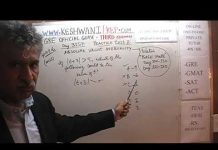

![CY_GATE_2019_PHYSICAL_SPECTROSCOPY_[ELECTRONIC_BASIC]_All IN ONE_[Short_Trick]_2018-19_PART_1ST - Videos](https://trends.edugorilla.com/wp-content/uploads/sites/8/2018/08/cy_gate_2019_physical_spectroscopy_electronic_basic_all-in-one_short_trick_2018-19_part_1st-218x150.jpg)



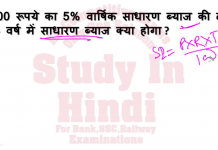
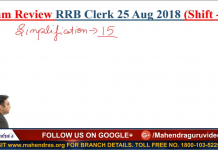

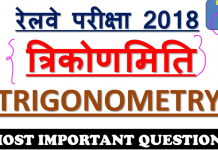
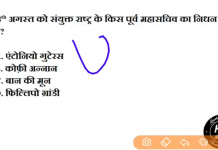
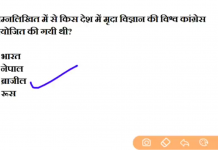
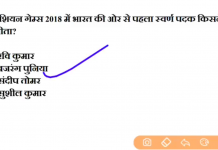




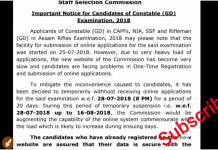
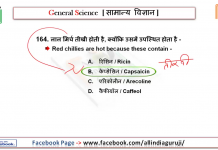


![24 August 2018 – The Indian Express Newspaper Analysis हिंदी में – [UPSC/SSC/IBPS] Current affairs - Videos](https://trends.edugorilla.com/wp-content/uploads/sites/8/2018/08/a520-218x150.png)
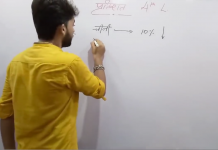



China, officially the People's Republic of China (PRC), is a unitary sovereign state in East Asia and the world's most populous country, with a population of around 1.404 billion.[13] Covering approximately 9.6 million square kilometres (3.7 million square miles), it is the world's second-largest state by land area[19] and third- or fourth-largest by total area.[j] Governed by the Communist Party of China, it exercises jurisdiction over 22 provinces, five autonomous regions, four direct-controlled municipalities (Beijing, Tianjin, Shanghai, and Chongqing) and the Special Administrative Regions Hong Kong and Macau, also claiming sovereignty over Taiwan.
good morning sir
Congratulations team study I Q.
Gm sir,Shaperation of power U.S.A se liya gaya hai…
plz give quote tropic specific..such as women empowerment, justice,poverty etc so that one can have good selection of quotes that can be used while writing essay..
Good morning
Sir Jab competition commission of India tha hamare des mein to uss samay kyu chup tha jab JIO ne aisi (free mein data provide karna) harkat ki thi?
congratulations sir…
Congratulations all of you gor winning an award
sir apka vedio dekhne ke baad kya newspaper padne ki bhi jarurat h ki sirf isse kaam hojayga
charter act 1773
.Eas of doing ranked India is 100
.Moody's announced ranking is baa2 and before baa3
.Mac mohan line b/w indo China border in Ap
Gd mrng sir …. this is my first answer …
After 22nd meeting of gst council at guwahati, it ia decided to set up up an autonomus body i.e. anti profiteering section ( which is also one of the provision in gst act) to ensure that the benefit of reduction is price on decreasing tax rate must be passed to consumers by traders. The body will consist of chairman and technical members appointed by pm and his cabinet . Apart from the authority many others commitee like steering commitee, standing commitew will be set up which work in states to assist the authority.
As its name,authority will work to curb any profitering ( unfair profit) made by traders from customers by charging higher price in the name of gst despite of reduction in tax.The authority will have the power to order the firmto pass the benefit of price reduction to customers, penalise, cancelling
the reg of firm. So the consumer will be benefited from the establishment of such authority.
However, the approach should be on the basis of demand supply curve not be decided by reduction in taxes. This does not mean that tax reduction will not benefit to customer but yes in long term, not overnight. ultimately tax reeduction will increase the supply with more investment and price will be reduced automatically.
Morever give tremendous power to any authoriy will definetly rise to autocratic decisions as well as less tranparency is expected from institutions.
Therefore providing such an authority is not a very good approach for economy .
Moody's rating of India from Baa-2 from Baa-3
Good morning sir
thank u sir keep it up
it's Czech republic pronounced like Check.. not Chez.
I hope you won't be angry ..
Question: 21st November 2017
Central GST Act provides for an Anti-Profiteering section to make sure that business pass on the benefits of tax rate reduction under the GST regime. Evaluate. (200 words)
Solution:
Introduction:
What is Anti-Profiteering Section?
The GST Council announced the anti-profiteering rules on 18th June 2016. Clause 171 has been inserted in the GST Act which provides that it is mandatory to pass on the benefit due to reduction in rate of tax or from input tax credit to the consumer by way of commensurate reduction in prices.
The crux of the anti-profiteering rules is-
• If there is reduction in rate of tax on the supply of goods or services or
• Benefit of input tax credit is now available under GST. Then a registered person must pass on the benefit by reduction in prices
Body/Analysis:
Section 171(1) casts responsibility to pass on the benefit of GST to the recipient for following two aspects:
a) Reduction of Tax Rate in New Tax Regime
Example:
i. Eating out has become cheaper under GST (mostly 18% GST as compared to earlier 20.5%). This benefit must be passed on to the consumers.
ii. FMCG items (Fast-moving consumer goods) are normally sold on MRP basis or some other fixed prices by retailers. If there is any reduction in rate of tax it has to be passed on to the ultimate recipient. Accordingly, there will be a need to revise MRP or other prices fixed for such supplies.
iii. If the tax rates are increased, tax under reverse charge imposed etc. then prices will increase.For example, domestic LPG was exempt from tax under earlier regime. Now they fall under 5% GST. This will result in an increase in the prices of cooking gas.
b) Benefit of Input Tax Credit
i. Almost all industries will be affected with respect to passing of benefit due to better credit chain. In most places, be it service sector, manufacturing, trading, or any specific industry, all are going to get advantage of better flow of input tax credit except sectors having zero-rated output supply.
ii. Radio taxis earlier could not adjust the input VAT on office supplies with the output service tax payable. Now, ITC on all inputs can be adjusted against output tax. These benefits are passed on by them in the form of offers and discounts. Similarly, many big stores have GST sales and special offers to pass on the benefit.
Conclusion/Way forward:
The reason behind such anti-profiteering measures is to protect the masses; the government should also ensure honest taxpayers are not harassed by these provisions. India should adopt and follow the mistake and consequence of it from other country like Singapore, Malaysia & Australia for the better implementation.
Goods & Services Tax Law in India is a comprehensive, multi-stage, destination-based tax that is levied on every value addition.
In other words, Goods and Service Tax is an indirect tax levied on the supply of goods and services. GST Law has replaced many indirect tax laws that previously existed in India.
With the commencement of GST an anti profiteering section was also introduced. Anti-profiteering, as the word suggests, is framed to prevent the businessmen from gaining profit from the reduced tax rates and to pass the reductions to the end users.
#Need of Anti-profiteering Clause
1. Easy flow of profit gained by rate cuts to the end users.
Many MNCs are reportedly increasing product's cost price to keep the end user's paid price unchanged and divert the profit
into their pockets.
2. Avoid high inflation rates and increased price of goods
India, taking lessons from other GST counties like Singapore where after implementation of GST inflation increased and
price of goods hiked, is taking precautionary measures to prevent a turmoil in economy.
3. Tightened the grip of authorities over the defaulters
# Impacts on Business
1. the anti-profiteering clause may effect the ease of doing business in India and my cause undue interference of government agencies.
2. It might upset the foreign investment.
However, anti-profiteering clause increases governments power of interference but it helps the real effect of GST to reach the common man of India. The powers conferred by this clause should be used sparingly and the steps to boost up competition in market should be emphasized upon. The increasing competition will automatically counter the negative impacts of anti-profiteering on businesses.
congratulation sir and thank you
Hi Sir
Goodevening everyone :–)
Union Cabinet has approved creation of National Anti-profiteering Authority (NAA) under GST, to ensure benefits of reduction in indirect tax rates are passed on to consumers.
Goods and Services Tax was introduced across all the states on July 1st, 2017. It subsumed over a dozen different kinds of taxes particularly Excise, State VAT, and Service Tax into one single Tax which is called GST. There are about different rate slabs and different commodities were categorised under these Tax slabs.One of the objectives of this GST was to introduce a Single market and a Single Tax regime so that both businesses and consumers can transparently know what the taxes are and how those taxes are to be paid.
The international experience of GST is that whenever such a Tax is rolled out "there is an element of unscrupulous and unprincipled trade and industry" which tries to take advantage of the new system by blaming it on the new tax system and they tend to raise prices. So therefore the Government in its wisdom, planned to setup an Authority which would keep an eye on whether trade and industry are taking undue advantage of the new tax regime and raising price to generate undue profit.This undue profit is on the basis of committing fraud which is after all a crime by deceiving customers in believing that there is a higher tax rate.
The cabinet gave clearance for setting up of an Anti-profiteering authority and it will be assisted by Safeguards authority. Directorate General of Safeguards in the Ministry of commerce has the mechanism to monitor the price behaviour patterns of Trade and industry.
During last GST council meeting held Guwahati, tax rates have been reduced on several items. It is expected that the reduced tax rates will make prices come down. But instead, Trade and industry can also take advantage and make profit out of it. With the introduction of NAA, now consumers will have recourse to justice.APA is different from consumer court. "This APA will have secretarial help from Directorate General of Safeguards".
There is a proposal to create a Consumer Welfare Fund under GST. The NAA authority will have a power of disgorgement. It means when an industry made an undue profit as a result of not passing on the benefit of lower taxes then that undue profit will have to be disgorged by industry. This money can be kept as part of Consumer Welfare Fund.
The success of this authority would lie in its efforts of deterrence.This authority will have to establish difference between genuine profit and an act of profiteering.
NAA has powers to initiate an enquiry and will recommend de-registration of Trade and industry under GST as an extreme step for any repeated violation.It can also ask the trade and industry to deposit excess profits into Consumer Welfare fund.
It is like a sanction rather than an acknowledgement of a crime on the part of perpetrator. So there would be a penalty attached to it and non-compliance means they cannot carryout business any further.Deregistration is a very useful step in a sense that the industry will have a fear of making undue profits.This specific piece of legislation will have to be passed by parliament and then it will become a body.
There is a sunset clause that this body will exist only for a period of Two years from the date of its setting up. The idea is that it should not be permanent body.So idea is that within two years GST tax will become part and parcel of the system therefore people will not indulge in any profiteering activity using GST as an excuse.
On the Way Forward,NAA must be backed up with a proper secretariat which does these investigations. The trade and industry will have to justify and establish that any increase in the price was backed up by a genuine increase in the input cost.
We cannot allow the functioning of this authority to act as an agent that dilutes the principle of Ease of doing business.
This authority cannot bring in another inspector raj; this authority will have to keep that in mind so that harassments are kept completely eliminated.The investigation has to be carried out as per the rule of law. Conflicts with other authorities which are empowered in a similar manner should be eliminated.It is also important for consumers to take action immediately.
Thanks for reading:-)
Hi Everyone…
These are my answers to the questions asked…
Q1: When was East India Company's monopoly completely abolished?
–>Charter act of 1813 ended the monopoly of the East India Company in India.However, the company’s monopoly in trade with China and trade in tea with India was kept intact.It was removed completely via Charter Act of 1833.
Q2: China-Arunachal Pradesh border?
–>McMohan Line
Q3: India's Rating?
–>Moody's Investors Service ("Moody's") in local and foreign currency issuer ratings: India was upgraded to Baa2 from Baa3.
World Bank in ease of doing business: 100 (India jumped 30 positions from 130)
Q4: Law on separation of power is adopted from which country?
–>It has been adopted by the US.
Q5: Mahanadi passes through which countries?
–>Chattisgarh and Odisha
Baa2 and 1oo rank
McMohan line India and tibbat border
1) competition commission of india estb on 14 oct 2003.
2) monopoly of east india ended in 1813 by the charter act of 1813.
3) arunachal border with china called ms mohal line based on the simla treaty 1914.
4) 1962 war was in between china and india over the area of himalayan region nd later they withdraw their army.
5) moody rating agecny gave Baa2 ftomm Baa3.
World bank gave india rating rating 100 among 190 nation in ease of doing business.
4) separation of ececutive power from judiciary power in const taken from usa.
5) mahanadi river origin from shawa hills of mp. And passes through mp, chatisgarh and orissa.
6) qpp to count tiger is mstripes_ monitoring system for tigers intensive protection and ecological status. By wildlife inst of india dehradun.
7) wimbkedon player jana novotra of czeck Republic died who won 14 grqnd slam award.
China
Capital– Beijing
Currency– yuan
Line bt china and india – Mac Mohan line
Ho
Sir in every lecture you promote your pendrive course but not providing the content. I have ordered 2 month ago and still I get only 3 sub lecture . Don't promote when you not able to complete your deal
Sir Revolt 1857 ke bare me vedios bao ..
Mahanadi
? source point – Sihawa, Dandakaranya, Chhattisgarh
Total coarse 858km.. It flows through the Orisha, Chhattisgard… Jai Hind Jai Bharat…
hello….
ans.
1. china
capital- beijing
currency- renminbe, yuan
highest population in world
2. mc mohan line is between india and china
3. moody's upgrade india ranking baa2 from baa3.
4. india latest ranking in ease of doing business is 100.
5.separation of power is taken from usa.
Evaluation of national anti profiteering authority
Under section 171 of the central goods and services tax act, national anti profiteering authority finds mention to oversee whether reduction in tax reaches to the final consumer and if the responsible company or organization fails to bring the effect, its registration can be cancelled.
However, if seen from another point of view, instead of providing an authority to oversee the whole transaction, it would be more effective to bring competition in the market. In this way the role of government will be as a facilitator rather than a regulator. The competition would invite investors as well as provide quality products to the consumer.
The establishment of authority would provide a negative image to the investors and will affect the economy in long run.
Creating competition would pressurize the company to reduce prices and benefit to the end consumer.
Sir it's ur hard work. U don't know, what u did.